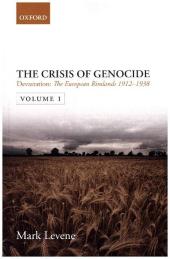 Neuerscheinungen 2016Stand: 2020-02-01 |
Schnellsuche
ISBN/Stichwort/Autor
|
Herderstraße 10
10625 Berlin
Tel.: 030 315 714 16
Fax 030 315 714 14
info@buchspektrum.de |

Mark Levene
Devastation
Volume I: The European Rimlands 1912-1938, Winner of the 2015 Lemkin Book Award
2016. 574 S. 5 black and white maps. 233 mm
Verlag/Jahr: OXFORD UNIVERSITY PRESS 2016
ISBN: 0-19-879169-0 (0198791690)
Neue ISBN: 978-0-19-879169-0 (9780198791690)
Preis und Lieferzeit: Bitte klicken
Explores the genocidal events of the period from 1912 to 1938, particularly focussing on the Balkans, the Great War, and the emergence of the Stalin and Hitler States, and seeks to integrate them into a single, coherent history.
From the years leading up to the First World War to the aftermath of the Second, Europe experienced an era of genocide. As well as the Holocaust, this period also witnessed the Armenian genocide in 1915, mass killings in Bolshevik and Stalinist Russia, and a host of further ethnic cleansings in Anatolia, the Balkans, and Eastern Europe. Crisis of Genocide seeks to integrate these genocidal events into a single, coherent history.
Over two volumes, Mark Levene demonstrates how the relationship between geography, nation, and power came to play a key role in the emergence of genocide in a collapsed or collapsing European imperial zone - the Rimlands - and how the continuing geopolitical contest for control of these Eastern European or near-European regions destabilised relationships between diverse and multifaceted ethnic communities who traditionally had lived side by side. An emergent pattern of toxicity can also be seen
in the struggles for regional dominance as pursued by post-imperial states, nation-states, and would-be states.
Volume I: Devastation covers the period from 1912 to 1938. It is divided into two parts, the first associated with the prelude to, actuality of, and aftermath of the Great War and imperial collapse, the second the period of provisional ´New Europe´ reformulation as well as post-imperial Stalinist, Nazi - and Kemalist - consolidation up to 1938. Levene also explores the crystallisation of truly toxic anti-Jewish hostilities, the implication being that the immediate origins of the Jewish
genocides in the Second World War are to be found in the First.
The book´s breadth of vision, attention to detail, and awareness of synchronicity across these very different regions are remarkable ... [The Crisis of the Genocide is] a remarkable, rich and suggestive history of national projects of elimination in Europe´s murderous first half of the twentieth century. Mark Roseman, Times Literary Supplement
Mark Levene is Reader in Comparative History at the University of Southampton, and in the Parkes Centre for Jewish/non-Jewish Relations. His writing ranges from Jewish history to genocide and anthropogenic climate change, including, most recently History at the End of the World? History, Climate Change and the Possibility of Closure (co-edited with Rob Johnson and Penny Roberts, 2010). He is founder of Rescue! History, and co-founder of the Crisis Forum. The
two volumes of Crisis of Genocide continue a multi-volume project - begun with The Meaning of Genocide and The Rise of the West and the Coming of Genocide (2005) - to chart the history of genocide in the age of the nation-state.


